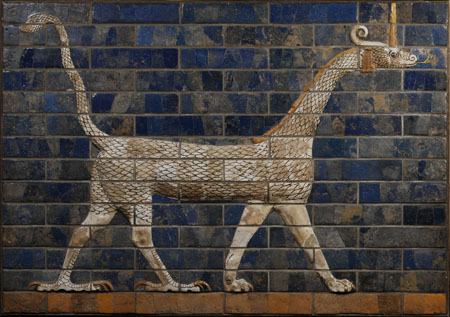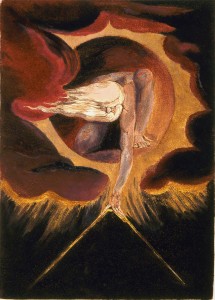Last week, we saw how the priestly account of creation in Genesis 1:1–2:4a proceeds in a careful, orderly fashion, with the first three days each paralleled by one of the second three days, in sequence. So, the creation of light on Day One (Gen 1:1-5) is paralleled on Day Four by the creation of the lights in the sky: the sun, moon, and stars (Gen 1:14-19).
On Day Two, God created the dome of the heavens, separating the waters above from the waters below and creating within the dome an open space. On Day Five, which parallels Day Two, God populates the air with birds, and the waters with fish and other creatures that live in the water (Gen 1:20-23).
Again, as on Day Three, the world is invited by God to take part in its own coming into being: “God said, ‘Let the waters swarm with living things, and let birds fly above the earth up in the dome of the sky’” (Gen 1:20).
God invites the water to bring forth living creatures, much as the plants had emerged from the earth. Since biologists theorize that life on earth began in the oceans, some have suggested that the Genesis account is, after all, scientifically accurate. Indeed, since according to 2 Peter 3:8 “with the Lord a single day is like a thousand years and a thousand years are like a single day”(see also Ps 90:4), it is sometimes suggested that each day in Genesis 1 may actually represent thousands or millions of years in our time.
This approach doesn’t work, however. The sequence described for the emergence of life in this chapter doesn’t fit the fossil record: for example, birds did not actually appear before land animals, but rather are descended from dinosaurs.

Further, the text says, again and again, “There was evening and there was morning”: the priests are imagining ordinary, twenty-four-hour days. This is important, as the sabbatical focus of Genesis 1:1–2:4a only works if we are talking about a sequence of seven days.
This means that we cannot shoehorn this story into our scientific world view –which is only a problem if believe that the Bible must be factual in order to be true. But since Genesis presents two different accounts in its opening chapters, it is already clear that the text will not permit us to read it as a literal, factual account of beginnings. This is not a scientific account, but a confession about God, and God’s relationship to our world.
Still, the idea that God calls upon the waters to bring forth fish is consistent with the theory of evolution: the fundamental concept in modern biology. For Israel’s ancient priests, as we saw in our discussion of Day Three, God creates in part by empowering the world to participate in its own creation, and enables the world to sustain itself. This line of thought is consonant with the attempts by biologists to understand the emergence of life in natural terms, while still recognizing God as creator.
Among the living creatures now swarming the seas, Genesis 1:21 tells us, are “the great sea animals” (CEB; the NRSV reads “the great sea monsters”). In Hebrew, the word is tanninim, which means dragons: the monsters of the abyss.

In the Babylonian creation epic the Enuma Elish, the sea monster Tiamat is the enemy that the creator god Marduk must defeat in order to make the world. But according to Israel’s priests, if there is a dragon in the sea, then God must have made it!
In Psalm 104, a beautiful psalm of creation, the sea monster (here called Leviathan) is marvelously and whimsically described:
And then there’s the sea, wide and deep,
with its countless creatures—
living things both small and large.
There go the ships on it,
and Leviathan, which you made, plays in it! (Ps 104:35-26).
The dragon delights in its watery world, just as God delights in all that God creates. Rather than the uncreated adversary of the Divine, the sea monster is one of the living things with which the waters swarm–just another fish, if a whopping big one!
This brings us to Day Six. Just as on Day Three God performed two creative acts (the land emerged from the water, and God invited the earth to bring forth plants), so Day Six features two creative acts of God. First, the animals are made, to live on the land and eat the plants:
God said, “Let the earth produce every kind of living thing: livestock, crawling things, and wildlife.” And that’s what happened (Gen 1:24).
Once more, the world is invited to participate in its own creation. Just as on Day Three the earth brought forth plants, and as on Day Four the waters brought forth living creatures, so now at God’s invitation the earth brings forth living creatures.

In keeping with the ordered priestly worldview, the land animals are divided into three classes. First are the behemah, or domestic animals: the sheep, goats, and cattle that share the human world.
Last are the chayyat ha’arets (more usually called chayyat hassadeh, which the King James translates literally as “the beasts of the field”): that is, the wild animals, belonging to the wilderness.
In between these two major classes of animals are the remes: the creeping things—creatures with either too many legs or not enough, which seem to pop up everywhere.

Now, the entire world is inhabited, with lights on the sky dome, fish in the seas, birds in the air, and animals filling every niche of the dry land.
But only with God’s second act on this sixth day is the population of the world complete. Last of all, as the climax and pinnacle of creation, God creates humanity:
Then God said, “Let us make humanity in our image to resemble us so that they may take charge of the fish of the sea, the birds in the sky, the livestock, all the earth, and all the crawling things on earth” (Gen 1:26).
This is a difficult and complex verse, worth taking some time to umpack. We will consider the creation of humanity, and finish our discussion of Genesis 1:1–2:4a, next week.
AFTERWORD:

All season long, it has been a joy to watch the Pittsburgh Pirates play baseball. Now, with their decisive victory over the Cincinnati Reds, the Bible Guy is foolishly pleased to report that the Pirates are in contention for the National League pennant, and the World Series. After 20 years without a winning season, let alone a playoff shot, it is most definitely time! LET’S GO BUCS!!!
